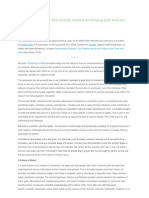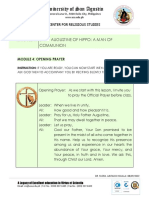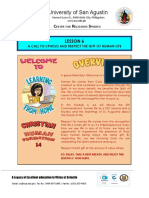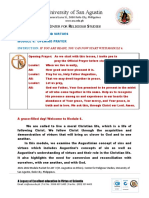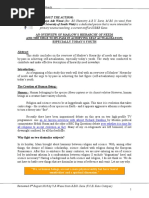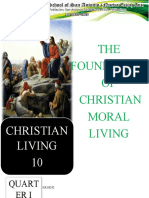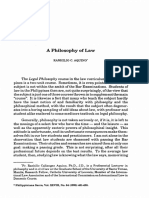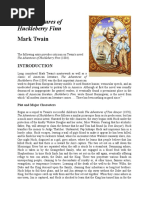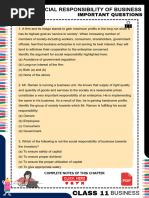CHF 14 Lesson 6
CHF 14 Lesson 6
Uploaded by
Andrew Theodore BalingitCopyright:
Available Formats
CHF 14 Lesson 6
CHF 14 Lesson 6
Uploaded by
Andrew Theodore BalingitOriginal Description:
Original Title
Copyright
Available Formats
Share this document
Did you find this document useful?
Is this content inappropriate?
Copyright:
Available Formats
CHF 14 Lesson 6
CHF 14 Lesson 6
Uploaded by
Andrew Theodore BalingitCopyright:
Available Formats
University of San Agustin
General Luna St., 5000 Iloilo City, Philippines
www.usa.edu.ph
CENTER FOR RELIGIOUS STUDIES
LESSON 6
A CALL TO UPHOLD AND RESPECT THE GIFT OF HUMAN LIFE
A grace-filled day! Welcome to Module 6!
Human life comes from God. He is the one who
created us and sustained our existence through His
Spirit. In our every breath, we breathe the Spirit of
Life. We continue to live. When our human race had
come to the point of eternal damnation for choosing
evil, He sent His only begotten Son to save us.
In this module 6, we will discuss the 5th
Commandment, human life as a Gift, Sacred and a
Mystery and the teachings of St. Augustine about
the threats of life.
Respect for human life comes from the recognition
that life is God's gift to us. It is indeed precious. Every
time we see life in any of its forms, we have an
opportunity to experience the presence of God.
Every human being enjoys the same gift. By
respecting life, we are honoring God; we are
celebrating the Spirit's presence among us.
14 Respect God’s gift of Life and you’ll value others.
SO, RELAX, TAKE A DEEP BREATH, AND ENJOY THIS
LESSON 6! GOD BLESS.
Email: crs@usa.edu.ph | Tel. No.: 0999-997-1485 | Fax No.: (033) 337-4403
University of San Agustin
General Luna St., 5000 Iloilo City, Philippines
www.usa.edu.ph
CENTER FOR RELIGIOUS STUDIES
Week 6/6 hours
The learner values and protects human life
wherever they are.
At the end of the lesson, the learners will be
able to:
1. Explain why human life is a gift, mystery
and sacred, and the basis for
respecting for human life.
2. Discuss offenses and threats to human
life as an offense to one’s dignity.
3. Ask the help of God to overcome the
threats to human life.
Email: crs@usa.edu.ph | Tel. No.: 0999-997-1485 | Fax No.: (033) 337-4403
University of San Agustin
General Luna St., 5000 Iloilo City, Philippines
www.usa.edu.ph
CENTER FOR RELIGIOUS STUDIES
Email: crs@usa.edu.ph | Tel. No.: 0999-997-1485 | Fax No.: (033) 337-4403
University of San Agustin
General Luna St., 5000 Iloilo City, Philippines
www.usa.edu.ph
CENTER FOR RELIGIOUS STUDIES
Email: crs@usa.edu.ph | Tel. No.: 0999-997-1485 | Fax No.: (033) 337-4403
University of San Agustin
General Luna St., 5000 Iloilo City, Philippines
www.usa.edu.ph
CENTER FOR RELIGIOUS STUDIES
A. Human Life: A Gift, Sacred and a Mystery
1. Human Life is a gift because it is freely given by God.
Human life comes from God. He is the One who created us and sustained our
existence through His Spirit. “For the Spirit of God made me, the breath of the
Almighty keeps me alive” (Job 33:4). In our every breath, we breathe the Spirit of life.
we continue to live. When our human race had come to the point of eternal
damnation for choosing evil, He sent His only begotten Son to save us. For God so
loved the world that He gave His only Son so that everyone who believes in Him might
not perish but might have eternal life” (John 3;16). “He does everything to keep us
alive as human persons whom He loves. He is the Lord and Giver of life, in whom we
live and move and have our being” (Acts 17:28). As Jacob cried out, “You have
granted me life and steadfast love; and your care has preserved my spirit” (Job
10:12). These loving acts of one God for us arose from His own volition. Thus, this life of
ours “is not a private possession, but is created, sustained, and guided now by the
creative, saving will, and love of Almighty God” (CFC 314).
2. Human life is a mystery because life is full of inexhaustible richness and beauty.
Science reveals not only the greatness of the gift of human knowledge and
ability but the mystery of the human body and life in general. There are always new
things, discoveries, and inventions. There is always more to know. In this regard, we
have to remain humble before God’s creation and realize it as His masterpiece.
Human life is and will remain a mystery before us. It comes from Him who is eternal.
3. Human life is sacred because we are created in God’s image and likeness,
being sustained by the Holy Spirit, and redeemed by the precious blood of
Christ.
Human life is sacred because we are created in His own image and likeness.
“God created man in His own image and likeness” (Genesis 1:27). Our Church
expresses that “All human life has its basic value and dignity, therefore, because we
Email: crs@usa.edu.ph | Tel. No.: 0999-997-1485 | Fax No.: (033) 337-4403
University of San Agustin
General Luna St., 5000 Iloilo City, Philippines
www.usa.edu.ph
CENTER FOR RELIGIOUS STUDIES
are all created in God’s image and likeness” (CFC 1029). It “is sacred because the
human person has been willed for its own sake in the image and likeness of the living
and holy God” (CCC 2319). We mirror the Divine. Our very thought, word, and action
when exercised accordingly, reflect that of our God. St. Bonaventure says that
“creation contains the footprints of God, that which is created mirrors its Maker and
because of that, is precious.” There is nothing about us that doesn’t mirror and come
from Him.
Human life is sacred because His Holy Spirit sustains our existence. It is His
breathe, Holy Spirit that keeps us alive. More deeply, we are made as His temple. We
are “temple of the Holy Spirit” (1 Corinthians 3:16). We are holy in relation to God Most
Holy. “Human life is sacred because from its beginning it involves the creative action
of God and it remains forever in a special relationship with the Creator, who is its sole
end. God alone is the lord of life from its beginning until its end” (CCC 2258).
Human life is sacred because it is redeemed by the precious blood of Christ.
Jesus saved us from sin that enslaves and gives death. By His Paschal Mystery, we are
given a new life. we are born again. It is on this purpose that He came – that we
“might have life, and have it to the full” (John 10:10). With this, St. John Paul II calls us:
“Let us then, all together, renew our esteem for that value of human life,
remembering also that, through Christ, all human life has been redeemed.”
B. The Fifth Commandment
The fifth commandment obliges us to respect life.
The fifth commandment, “You shall not kill” (Exodus 20:13) forbids direct attacks
on human life and physical integrity. It does not only command us not to violate
human life. It obliges us to “protect God’s gift of life and promotes practical care and
respect for the life and dignity of all persons” (cf. CHF 1028). God as the source of all
good including life (cf. Acts 17:28), did not give the human beings absolute dominion
over their lives, but rather gave them the responsibility of guarding their own lives and
of those around them. (Socias 236)
“Every human life, from the moment of conception until death, is sacred because
the human person has been willed for its own sake in the image and likeness of the
living and holy God.” (CCC 2319) Human life has sacred and inviolable character,
which reflects the inviolability of the Creator Himself. Precisely for this reason, God will
severely judge every violation of the commandment “you shall not kill,” the
commandment which is at the basis of all life together in society. He is the goal, the
defender of the innocent (cf. Gen 4:9-15; Is 41:14; Jer 50:34; Ps 19:14).
The fifth commandment is the basis of the Catholic doctrine concerning the
value of life. Killing an innocent person is a grave sin contrary to the natural law,
Email: crs@usa.edu.ph | Tel. No.: 0999-997-1485 | Fax No.: (033) 337-4403
University of San Agustin
General Luna St., 5000 Iloilo City, Philippines
www.usa.edu.ph
CENTER FOR RELIGIOUS STUDIES
dignity of the person, and the holiness of the Creator. The Father commands
everyone to respect his own life and the lives of others.This commandment deals with
protecting the most fundamental human right: the right to existence itself. For that
reason, God reminds humanity in the Old Testament that He is the only owner of life
and that, when creating the human person, He gave him the personal right to
defend it, and defense against an unjust aggressor is a grave obligation for the
common good. No one can deny this right, and therefore to attempt to take one’s
own life or that of another is especially serious. (Socias 237)
Jesus fulfilled this command when He directly linked it with His love command.
“You have heard the commandment ‘You shall love your countryman and hate your
enemy.’ My command to you is: Love your enemies, pray for your persecutors. This will
prove that you are sons of your Heavenly Father, for His sun rises on the bad and the
good, he rains on the just and the unjust” (Matthew 5: 43-45). Love is the reason why
in many instances, we overcome our pride and selfishness and rather think of what is
good for others. With love, we gain the courage and strength to hurt no one. Love
and life are distinct but inseparable. Love motivates us to respect life. Life enables us
to love. Thus, the command of Christ to love one another even our enemies is a
command as well to respect life. (Diaz, 2019)
In the Sermon on the Mount, Jesus also enriched it with these words: “You have
heard that it was said to the men of old, ‘You shall not kill and whoever kills be liable
to judgment.’ But I say to you that everyone who is angry with his brother shall be
liable to judgment; whoever insults his brother shall be liable to the council, and
whoever says, ‘You fool!’ shall be liable to the hell of fire. So if you are offering your gift
at the altar, and there remember that your brother has something against you, leave
your gift there before the altar and go; first be reconciled to your brother, and then
come and offer your gift.” (Mt 5:21-24)
Moreover, the call to respect life includes raising the quality of our everyday
living both materially and spiritually, and that of our relationship with other people. We
enjoy in fullness the beauty of human life by living in this world and with other people
in love and peace. (Diaz, 2019)
“The fifth commandment enjoins respect for bodily and spiritual life in ourselves
and in our neighbor. But this can be seen and practiced in a proper way only
from the point of view of charity. Life material and especially spiritual life – is the
greatest of all gifts. One of the most fundamental expressions of the love we
have for ourselves is the preservation of life, and we as Christians, are
concerned above all with preserving and gaining secure possession of eternal
life in God, through the proper use of bodily life.” (Sr. Ma. Veritas Grau) (Diaz,
2019)
Email: crs@usa.edu.ph | Tel. No.: 0999-997-1485 | Fax No.: (033) 337-4403
University of San Agustin
General Luna St., 5000 Iloilo City, Philippines
www.usa.edu.ph
CENTER FOR RELIGIOUS STUDIES
The fifth commandment obliges us to conserve the existing life.
The greatest personal possession of the natural order is life itself. Life is the
necessary condition for the enjoyment of all blessings, even those that are spiritual. To
deprive someone of life is to inflict upon him the greatest harm of the natural order…
a sin that is obviously all the more serious because it is irreparable. When someone is
murdered, he stays murdered; a murderer cannot restore life.
Only God is the absolute owner of human life, and one must try to live his life
to the best of his abilities according to the design of the Potter and that is God.
Therefore, everyone is seriously obliged to take care of life as a good steward whose
life is lending from God. To protect one’s own life, each person is permitted to defend
himself/herself when under attack, even if the consequence is the unintended death
of an unjust aggressor. Self-defense permits only the force necessary to repel an unjust
attacker. Legitimate self-defense is morally acceptable (CCC 2263-67)
C. Threats to Human Life
1. Anger is a strong emotion of displeasure and belligerence aroused by a
perceived danger or assault.When left unrestrained, it may degenerate into
quarreling, insults, wrath, and manslaughter. Jesus strongly condemned anger,
when he said:“Whoever Hates his brother is a murderer”(1 John 3:15).
2. Murder is the unlawful and premeditated killing of a human being, and demands
for divine vengeance. Murderer sought to be eliminated from human society, as
God commanded:“Anyone who sheds the blood of a man, by a man shall that
one's blood be shed” (Genesis 9:6).
3. Abortion is the deliberate killing of an unborn child, in whatever way or time from
the moment of conception. In the world over 50 million babies are aborted every
year,making an astonishing 1.3 billion since 1980. Augustine vigorously
condemned the practice of induced abortion. Procreation was one of the goods
of marriage; abortion along with drugs- cause sterility frustrating this good. It lay
along a continuum which induced infanticide as an instance of “lustful cruelty” or
“cruel lust” (nupt. Et conc.1.15.17). Augustine called the use of means to avoid
the birth of a child an “evil work”: a reference to either abortion and
contraception (b.conjug.5.5).
4. Euthanasia is the intentional termination of the life of a person deemed to be
handicapped, sick, or dying. However, it is legitimate to discontinue extraordinary
life-sustaining treatments that are over-zealous, burdensome, or disproportionate
to the expected outcome.
5. Suicide is the act of intentionally causing one’s own death. Around one million
Email: crs@usa.edu.ph | Tel. No.: 0999-997-1485 | Fax No.: (033) 337-4403
University of San Agustin
General Luna St., 5000 Iloilo City, Philippines
www.usa.edu.ph
CENTER FOR RELIGIOUS STUDIES
people die by suicide every year, making it the tenth leading cause of death
worldwide. Conscious and deliberate suicide is a grave sin, because we are not
the owners but the stewards of our life. Augustine considered suicide to be
self-murder and a sin, challenging the notion of its honorable quality in some
circumstances (civ. Dei 1.23). Part of the unique seriousness of this sin lay in its
exclusion of the possibility of repentance- through the death of the sinner, as in
the case of Judas, who gave in to despair (civ. Dei 1.17). The sack of Rome raised
the issue of suicide committed to avoid rape. Augustine noted that no one with
any human feelings could refuse to forgive those who killed themselves in this
situation; yet he also insisted that those who killed themselves were guilty of
murder. Taking the law into one’s own hands, even to kill the wicked, was
forbidden. How much more would be the killing of one’s innocent self?(civ.Dei
1.17). Scripture contained no precept and gave no permission for taking one’s
own life, either for the sake of enjoying immortality sooner or of avoiding evil in this
life (civ.Dei 1.20). For Augustine, the example of Cato, who committed suicide
rather than live under Caesar, was outweighed by Job, who endured suffering
rather than take his own life (civ.Dei 1.24). The bodily defilement involved in rape
could not cause sin; even if it could, the sin of suicide was far more serious
(civ.Dei 1.25; 1.27).
6. SUBSTANCE ABUSE (Pirlo, 2016)
Substance abuse is the addictive consumption of any stuff harmful to the
individual and society, such as alcohol, tobacco, and illicit drugs.
a. Alcohol. Medicine tells us that a small amount of alcohol is needed by our
bodies. However, when drinking liquor containing alcohol is abused, this
becomes sinful and dangerous. Some of its effects are: 1) weakening of the
reasoning power and self-control, 2) boisterous and aggressive behavior, 3) loss
of coordination and sense of perception, 4) violent emotional behavior, and 5)
complete unconsciousness. Some of the crimes happen either because the
criminal or the victim is drunk. (Diaz, 2019). Alcohol addiction causes
cardiovascular diseases and liver cirrhosis, and brings about family violence
and road accidents (Pirlo, 2016).
b. Tobacco. “Cigarette smoking is dangerous to your health." We can find this
reminder on every pack of cigarettes. Yet, many are still smoking. We know
that smoking causes lung cancer, vascular diseases, and heart attacks,
causing millions of deaths a year. Some reasons that we can guard ourselves
so that we do not get caught into its menace are: 1) peer pressure, 2) false
sense of belongingness, 3) macho image, 4) trend, 5) association with people
from the upper class, and 6) curiosity. These are illusions that temporarily make
Email: crs@usa.edu.ph | Tel. No.: 0999-997-1485 | Fax No.: (033) 337-4403
University of San Agustin
General Luna St., 5000 Iloilo City, Philippines
www.usa.edu.ph
CENTER FOR RELIGIOUS STUDIES
us feel good but slowly weaken our health. (Diaz, 2019)
c. Illicit drugs. The addiction to forbidden drugs is extremely dangerous for health
and destructive for society. (Pirlo, 2016) Their ordinary victims are youths who
are adventurous and desirous for new experience. And their clients are people
who want to temporarily escape from pains and sufferings. Our Church
reminds us that the use of drugs “inflicts very grave damage on human health
and life. Their use, except on strictly therapeutic grounds, is grave offense”
(CCC 2291)
7. We must avoid all occasions that might endanger our physical and spiritual health.
a. LETHARGY: It is the refusal to perform physical activity, which causes health
deterioration, spiritual laziness, and social apathy.
b. GLUTTONY:It is the excessive consumption of food, which brings about obesity,
sickness and early death.
c. RECKLESSNESS: It is the practice of dangerous or illegal activities that expose
human life to mortal danger without a serious reason.
8. Organ Transplant: The transplant of organs is morally acceptable if the organs are
legally taken from dead bodies, or from living donors with their explicit consent. The
growing demand for organs has triggered a criminal black market where millions of
poor people are forced to sell their organs to rich recipients, while others are
intentionally killed to extract their body parts.
Email: crs@usa.edu.ph | Tel. No.: 0999-997-1485 | Fax No.: (033) 337-4403
University of San Agustin
General Luna St., 5000 Iloilo City, Philippines
www.usa.edu.ph
CENTER FOR RELIGIOUS STUDIES
Exemplary Competent Developing
Rubric Categories
5 3 1
Content
Graphics- Relevance
Visual Clarity and Appeal
Punctuality
Email: crs@usa.edu.ph | Tel. No.: 0999-997-1485 | Fax No.: (033) 337-4403
University of San Agustin
General Luna St., 5000 Iloilo City, Philippines
www.usa.edu.ph
CENTER FOR RELIGIOUS STUDIES
● Life comes from God; thus it is a gift, sacred, mysterious and inviolable.
● The fifth commandment, “You shall not kill” (Exodus 20:13) does not only
command us not to violate human life. It obliges us to “protect God’s gift of life
and promote practical care and respect for the life and dignity of all persons”
● Human Life is a gift because it is freely given by God.
● Human life is a mystery because life is full of inexhaustible richness and beauty.
● Human life is sacred because we are created in God’s image and likeness,
being sustained by the Holy Spirit, and redeemed by the precious blood of
Christ.
Email: crs@usa.edu.ph | Tel. No.: 0999-997-1485 | Fax No.: (033) 337-4403
University of San Agustin
General Luna St., 5000 Iloilo City, Philippines
www.usa.edu.ph
CENTER FOR RELIGIOUS STUDIES
· Alvarez, Czar Emmanuel & Cabahug, Reo. “ASF 3: Augustinian
Ethics”. Unpublished.2021
· Diaz, Jade. “Signs of the Times, Obey My Commandments”.Rex Book
Store, 2019
. Pirlo,Paolo. “The Ten Commandments”. Sons of Holy MAry
Immaculate Quality CAtholic Publications, 2016
· Holy Bible. The New American Bible (2006). Philippine Bible Society
Email: crs@usa.edu.ph | Tel. No.: 0999-997-1485 | Fax No.: (033) 337-4403
University of San Agustin
General Luna St., 5000 Iloilo City, Philippines
www.usa.edu.ph
CENTER FOR RELIGIOUS STUDIES
Email: crs@usa.edu.ph | Tel. No.: 0999-997-1485 | Fax No.: (033) 337-4403
University of San Agustin
General Luna St., 5000 Iloilo City, Philippines
www.usa.edu.ph
CENTER FOR RELIGIOUS STUDIES
Email: crs@usa.edu.ph | Tel. No.: 0999-997-1485 | Fax No.: (033) 337-4403
You might also like
- Spontaneous EvolutionDocument5 pagesSpontaneous EvolutionPannaga Rao50% (2)
- Hall - Culture Community Nation Stuart HallDocument17 pagesHall - Culture Community Nation Stuart HallÁdám ViskiNo ratings yet
- Asf 1 Module 4 - Saint Augustine of Hippo A Man of CommunionDocument21 pagesAsf 1 Module 4 - Saint Augustine of Hippo A Man of CommunionTed Dian TejadoNo ratings yet
- Paulinian Ethics Modules by ChumairaDocument13 pagesPaulinian Ethics Modules by ChumairaNndaydna75% (4)
- Human Dignity in The Redemptive Act of Christ and Introductory Concepts On Man and SocietyDocument33 pagesHuman Dignity in The Redemptive Act of Christ and Introductory Concepts On Man and Societysteph marburyNo ratings yet
- CHF 14 Lesson 6Document15 pagesCHF 14 Lesson 6Hanz Gabriel DegomaNo ratings yet
- Lesson7 Grade 11Document10 pagesLesson7 Grade 11Anna Rose JosephNo ratings yet
- Combine PDFDocument27 pagesCombine PDFAnna Rose JosephNo ratings yet
- CHF 14 Lesson 5Document13 pagesCHF 14 Lesson 5Andrew Theodore BalingitNo ratings yet
- Asf 1 Module 3 - The Socio-Cultural Context During The Time of Augustine of HippoDocument25 pagesAsf 1 Module 3 - The Socio-Cultural Context During The Time of Augustine of HippoTed Dian TejadoNo ratings yet
- Asf 2 Module 1 I Augustine On The Economy of SalvationDocument13 pagesAsf 2 Module 1 I Augustine On The Economy of SalvationChris Jaylo JrNo ratings yet
- MODULE 9 The Spiritual SelfDocument7 pagesMODULE 9 The Spiritual Selfjoey delgadoNo ratings yet
- Human DignityDocument12 pagesHuman Dignityathulya mrNo ratings yet
- Asf 2 Module 4 I The Paschal Mystery of ChristDocument11 pagesAsf 2 Module 4 I The Paschal Mystery of ChristShara Mae SameloNo ratings yet
- Learning Plan CLE-9Document5 pagesLearning Plan CLE-9Caren PondoyoNo ratings yet
- Human Dignity in The Story of Creation - Course NotesDocument6 pagesHuman Dignity in The Story of Creation - Course NotesaNo ratings yet
- Module-Students-CopyDocument15 pagesModule-Students-CopyCyrisse Kaye GuinabanNo ratings yet
- IPHP Module 8Document2 pagesIPHP Module 8Mary GarciaNo ratings yet
- THEO - 4 - Moral TheologyDocument35 pagesTHEO - 4 - Moral TheologyAzariah EribalNo ratings yet
- Topic Life After DeathDocument3 pagesTopic Life After Deathllia60220No ratings yet
- Asf 3 Module 6 Sins and Virtues Edited As of July 19 2022Document12 pagesAsf 3 Module 6 Sins and Virtues Edited As of July 19 2022HelloNo ratings yet
- Asf 3 Module 6 Sins and VirtuesDocument12 pagesAsf 3 Module 6 Sins and VirtuesHelloNo ratings yet
- UTS Module 9-11Document22 pagesUTS Module 9-11mikaela thereseNo ratings yet
- Maslow's Review 6th August, 2018Document22 pagesMaslow's Review 6th August, 2018Yahaya Ado WasaiNo ratings yet
- CHF 13 - M4 - Family PDFDocument26 pagesCHF 13 - M4 - Family PDFLarsNo ratings yet
- ESPINO Julianne My CFE 101 Creative Journey PDFDocument17 pagesESPINO Julianne My CFE 101 Creative Journey PDFJohn Kerby TamayoNo ratings yet
- THEOLOGICAL FOUNDATION OF EDUCATIONdocxDocument7 pagesTHEOLOGICAL FOUNDATION OF EDUCATIONdocxshaira.lauronNo ratings yet
- Reed 123Document11 pagesReed 123angel sychingNo ratings yet
- EDUC. 403 Laurence R. Cantor EssayDocument2 pagesEDUC. 403 Laurence R. Cantor EssayCristine Joy B. OroNo ratings yet
- INS201 PaulineEthics RomeoBalingaoDIT1 06052017Document5 pagesINS201 PaulineEthics RomeoBalingaoDIT1 06052017Romeo BalingaoNo ratings yet
- Asf 2 Module 2 I Sacred ScriptureDocument14 pagesAsf 2 Module 2 I Sacred ScriptureabelusoNo ratings yet
- 5 Q1 Intro To PhiloDocument27 pages5 Q1 Intro To Philokristanhalili12No ratings yet
- While Watching The Presentation Video For Module 4 Professors Earley's Emphasize DallasDocument4 pagesWhile Watching The Presentation Video For Module 4 Professors Earley's Emphasize Dallassilk22223333_9232821No ratings yet
- The Universal God: The Search for God in the Twenty-First CenturyFrom EverandThe Universal God: The Search for God in the Twenty-First CenturyNo ratings yet
- Some People Treat Others As Objects.Document4 pagesSome People Treat Others As Objects.Lee DokyeomNo ratings yet
- IWRBS - Q1 - Mod1 - Worldviews Belief Systems and ReligionDocument9 pagesIWRBS - Q1 - Mod1 - Worldviews Belief Systems and Religionian esplanaNo ratings yet
- Flying High - FinalDocument132 pagesFlying High - Finalvarun kumarNo ratings yet
- Asf 1 Module 2 - The Ecclesial and Historical Contexts During The Time of Augustine of HippoDocument17 pagesAsf 1 Module 2 - The Ecclesial and Historical Contexts During The Time of Augustine of HippoTed Dian TejadoNo ratings yet
- Work Text ON Introduction To World Religion & Belief System Week 1Document9 pagesWork Text ON Introduction To World Religion & Belief System Week 1O N I NNo ratings yet
- CHF 3 Lesson 1 St. Augustine On WorshipDocument29 pagesCHF 3 Lesson 1 St. Augustine On WorshipFrancis Lawrence TubidNo ratings yet
- Asf 4 Module 5 I The Churchs Social EncyclicalsDocument13 pagesAsf 4 Module 5 I The Churchs Social EncyclicalsAlec MagcanamNo ratings yet
- Module CL10 Quarter 1Document17 pagesModule CL10 Quarter 1Gieanne Aron Tinio CruzNo ratings yet
- CHV4 LESSON 2 Pagpapakatao Dignity Life of The Human PersonDocument41 pagesCHV4 LESSON 2 Pagpapakatao Dignity Life of The Human PersonheartfamilyemailNo ratings yet
- Lesson 1Document24 pagesLesson 1Norven B. GrantosNo ratings yet
- The Screwtape Letters FinalDocument5 pagesThe Screwtape Letters FinalShane SearfossNo ratings yet
- University of San AgustinDocument53 pagesUniversity of San AgustinKylene MontalbaNo ratings yet
- Augustine 3 Lesson 3Document39 pagesAugustine 3 Lesson 3bbadiangoNo ratings yet
- Asf 1 Module 1 - Augustine S Early Childhood His Formal Education and His Teaching MinistryDocument28 pagesAsf 1 Module 1 - Augustine S Early Childhood His Formal Education and His Teaching MinistryTed Dian TejadoNo ratings yet
- Zion Desamero - Endterm Exam 2020-21Document2 pagesZion Desamero - Endterm Exam 2020-21Zion EliNo ratings yet
- Christianity Philosophy and Ethics 2 PDFDocument30 pagesChristianity Philosophy and Ethics 2 PDFTrinity School, CarlisleNo ratings yet
- Lesson 5-7Document97 pagesLesson 5-7wad skwedNo ratings yet
- Lesson 3 The Body Respects Gods ImageDocument22 pagesLesson 3 The Body Respects Gods ImageJohn Jeriel AlbaranNo ratings yet
- Philo of Man CapSLET LC 3.1Document12 pagesPhilo of Man CapSLET LC 3.1Arabella ParkNo ratings yet
- 4 Matters of Life and DeathDocument8 pages4 Matters of Life and DeathOptimistic anonymousNo ratings yet
- Midterm Exam ReviewerDocument7 pagesMidterm Exam ReviewerJapon, Jenn RossNo ratings yet
- Week 12-14 UTSDocument44 pagesWeek 12-14 UTSlizazalisasaNo ratings yet
- What Is A PersonDocument24 pagesWhat Is A PersonAndrias Oktavianto100% (1)
- Therapeutic Communication TechniquesDocument3 pagesTherapeutic Communication TechniquesDersly Lane100% (1)
- TSPSC - Group 4 Applications MounikaDocument3 pagesTSPSC - Group 4 Applications Mounikakethavath srinuNo ratings yet
- War On DrugsDocument1 pageWar On DrugsJOANNA MARIE FORGESNo ratings yet
- Letter For Researchgroup 123 1 1Document3 pagesLetter For Researchgroup 123 1 1Zarina faith Galoso TamarraNo ratings yet
- Lokesh CR 99 (Part 1)Document46 pagesLokesh CR 99 (Part 1)Hemang KhatriNo ratings yet
- February Module Q3Document2 pagesFebruary Module Q3jhon klein chavezNo ratings yet
- Dumalneg National High SchoolDocument5 pagesDumalneg National High SchoolAldrich SuarezNo ratings yet
- Gma Kapuso Mo Jessica SohoDocument10 pagesGma Kapuso Mo Jessica SohoVNH乂John GamingNo ratings yet
- Session 2: A Philosophy of Law-Ranhilio AquinoDocument28 pagesSession 2: A Philosophy of Law-Ranhilio Aquinojal339No ratings yet
- 04 Contents PDFDocument13 pages04 Contents PDFVinay Kumar KumarNo ratings yet
- Busuppint TRD Test U1Document3 pagesBusuppint TRD Test U1Masterclass IdiomasNo ratings yet
- (Standard Forms of Construction Contract - Type of Construction Contract)Document87 pages(Standard Forms of Construction Contract - Type of Construction Contract)ameenabakhariNo ratings yet
- The Adventures of Huckleberry FinnDocument3 pagesThe Adventures of Huckleberry FinnCrina Mitran100% (1)
- Worksheet SOCIAL RESPONSIBILITY OF BUSINESSDocument24 pagesWorksheet SOCIAL RESPONSIBILITY OF BUSINESSamannxvi24No ratings yet
- Organizational Psychology: Group AssignmentDocument34 pagesOrganizational Psychology: Group AssignmentPRAGATI MIMANINo ratings yet
- Alan Watts On JungDocument4 pagesAlan Watts On JungMargareta ZolnjanNo ratings yet
- Sf9 (Report Card) Grade 4Document2 pagesSf9 (Report Card) Grade 4ALEXZAISM100% (1)
- JETHREMDocument3 pagesJETHREMJavicueNo ratings yet
- Corporate Social Responsibility in The United States and Europe How Important Is It The Future of Corporate Social ResponsibilityDocument10 pagesCorporate Social Responsibility in The United States and Europe How Important Is It The Future of Corporate Social ResponsibilitySadikNo ratings yet
- Format For Letter of Bid (To Be Uploaded by The Bidder On His Letter Head During Submission of Bid Online)Document2 pagesFormat For Letter of Bid (To Be Uploaded by The Bidder On His Letter Head During Submission of Bid Online)Vipul SinghNo ratings yet
- Enemies of The Roman Order - Treason, Unrest and Alienation in The Empire (1966, Harvard University Press) PDFDocument390 pagesEnemies of The Roman Order - Treason, Unrest and Alienation in The Empire (1966, Harvard University Press) PDFSol Invictus4100% (1)
- Managerial Ethics and Corporate Social ResponsibilityDocument7 pagesManagerial Ethics and Corporate Social Responsibilityariel bambalanNo ratings yet
- Gabriel Almond Sidney Verba Political ParticipationDocument3 pagesGabriel Almond Sidney Verba Political ParticipationDagmawit GirmaNo ratings yet
- Ucsp Week 2Document6 pagesUcsp Week 2Jhunaaa AgoiloNo ratings yet
- Ultracell WarrantyDocument2 pagesUltracell Warrantysoufiane hallaouiNo ratings yet
- Health Care Ethics Module EdittedDocument65 pagesHealth Care Ethics Module EdittedPrincess PascualNo ratings yet
- 28.12-Today-many-people-are-spending-less-and-less-time-at-home-đã chuyển đổiDocument1 page28.12-Today-many-people-are-spending-less-and-less-time-at-home-đã chuyển đổiNgoc AnhNo ratings yet
- 2 Professional Code of Ethics PDFDocument11 pages2 Professional Code of Ethics PDFChitradevi RamooNo ratings yet
- Synonym AntonymDocument6 pagesSynonym Antonymrishirawatfreefire1No ratings yet
